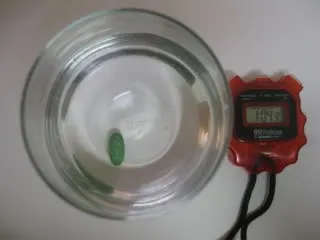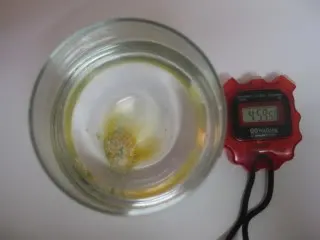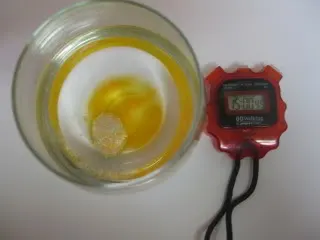Over the course of the past two weeks, I have had multiple conversations centered around vitamins.
Someone saw a “special” on TV where they talked about vitamin clogging sewage systems.
Another read where if you eat vitamin-fortified cereal, it blocks your body’s ability to absorb natural vitamins and someone else pointed out that I wasn’t taking the “recommended” daily dose of my vitamin…Yikes!
I invited Kim from The Leppers Blog to share with me The Vitamin Truth. I found it to be interesting and LOVE the experiment!
A little about Kim:
“I’m a former student and world traveler turned high school teacher turned to stay at home mom.
I enjoy knitting, baking, tutoring, yoga and getting people healthy.
I like to and try to plan, but God usually just laughs and does his own thing.”
Vitamins, Scandals
and “Pigs-Eye”
Oh My!
We’ve all heard the rumors about vitamins and sewage plants…In the Twin Cities, there is a sewage treatment plant named “Pig’s Eye.”
Workers there literally haul away tons of undigested vitamins every year that are clogging their filters.
Some of which you can still read the brand name.
Go ahead, do a Google search and read more on this Urban Legend…or, is it?
Or… there is a less nauseating approach.
It takes a little research and a glass of water, but it can give you some peace of mind.
Either that or some serious sticker shock- depending on how much money you may have flushed away over the years!
But first…I’m getting some negative vibes from a few readers…
“Bah, humbug. I don’t need to take any vitamins.”
If you are eating the food pyramid, then you’re probably right.
If not, then supplementation is necessary to fill in any nutritional gaps.
“All vitamins do is produce really expensive pee.”
Ah, yes.
Well, some do.
And, actually, some vitamins do more harm than good.
There was a study published by University California Berkley recently that looked at long term use of supplements. How does your health compare?
Supplements, simply put, are nutritional insurance.
The trick is getting good insurance.
So, how to choose?
Well, let’s take a look at some Sneaky Secrets most vitamin companies hope you never find out…Get your bottle out and let’s read some fine print:
1) The Moochers
The phrase, “Studies indicate that taking ____________ can _____________.”
Many companies quote research on a particular vitamin but don’t do any research on their own- using another company’s results to promote their own product.
They are playing word games.
2) Mg vs mcg
Many companies love tooting their own horn, saying their product contains a ‘hot market’ item.
Again, they quote research.
What they don’t do is put the proper amount of that ‘hot’ item in the product to do you any good.
For example, lutein is big right now (helps with vision).
It takes 1000 micrograms to equal one milligram.
The studies done were based on 6 milligrams.
Most amounts on the market?
600 micrograms.
3) Magic Beans?
Look at the ingredient label.
Does it seem to have more items listed than your grocery list?
Other than magic or Wonka Vision, I’m not sure how it’s possible to get all your supplemental needs into one small pill.
I’m sorry, but those All-in-One inclusive formulas?
They’re so weak you’d have to take a fist-full to get any benefit.
4) Top Secret
Some companies don’t want to give their formula because it’s ‘proprietary’, so they list the ingredients in a complex or a blend.
This is just a way for them to mix inexpensive raw materials with expensive ones.
Wanna take a guess what the bulk of the formula is made of?
5) Leaf or Stem?
Even if the correct dosage is listed, many times the least expensive (and less effective/active) part of the plant is used.
Would you rather eat the peel of a banana or the fruit?
6) Ignorance is bliss
Lots of companies take advantage of the fact that most consumers are ignorant.
Even if the correct dosage is used, and even if the expensive part is selected- they can still cut corners by using powders instead of extracts.
For example, Ginkgo Biloba (used for memory) extract comes in 60 mg dosages.
You need 3000 mg of the powder to equal 60 mg in extract form.
Many companies use the powdered formulation, figuring you won’t know the difference (and you won’t get the benefits either!)
7) But it’s on sale!
In the herbal and supplement industry, a sale is not a good thing.
Most likely deep discounts are due to old ingredients that have lost most of their potency.
By the time you get it, the potency is long gone.
Another reason for discounts is synthetic ingredients.
Vitamin E, for example.
If it is listed with the letters “dl” in front of the words alpha-tocopherol, it is synthetic.
An all-natural form will list only the “d”.
So- anyone finds any of these on their bottle?
The Vitamin Experiment!
Let’s OPEN the bottle now and do a little experiment!
Get your camera and timer ready.
Take your vitamin and place it in a glass of warm water, mixed with equal parts of vinegar.
Take a picture at 1, 5, 15, and 30 minutes.
Here is mine:





How did you do?
Is anyone’s still solid?
If your vitamin isn’t a loose powder within 15 minutes- it’s probably time to look for another brand.
If your vitamin did dissolve- great!
But how do you know if that powder is actually worth anything?
Here are three rules of thumb:
1) Are yours chemically made or from whole foods?
Why does this matter?
If I set a glass of orange juice and a glass of HiC on the table (both with 100% DV of vitamin C) would you say they are equally healthy?
Unfortunately, the FDA has almost no regulation on vitamins.
As far as they are concerned, synthetic and natural vitamins are the same thing.
And that prescription-strength or pharmacy grade prenatal?
Not any different!
2) Are you taking it every day?
Just like you need to take medication as directed in order to get the benefits, so too must you take the supplement daily to get the health benefits
3) Do you notice a difference when you are taking your supplements (or better, when you DON’T take your supplements)?
Most people don’t think twice about such a thing.
They take their supplements and hope or suppose it’s doing them some good.
Let me ask you this, If you started eating the food pyramid, do you think you’d notice a difference in your health?
Of course!
So if your supplements are supposed to be supplementing your diet- you should be able to notice a difference!
This can be measurable in your blood pressure, cholesterol, or even acne or subjective like your energy level and cold resistance.
What now?
If you do have a company you trust and want to really make a change in your body and don’t know where to start, here are some basics that a lot of people today need more of (the more symptoms you have under a vitamin, the more likely you could benefit from it)*:
Take more B’s if…
- you’re tired all the time
- irritable
- crave sweets and caffeine
- have headaches
- have lots of stress
- have PMS
- have mood swings
- rapid heartbeat/palpitations
- high homocysteine level
- ridges in nails
- skin problems/hair loss
- pregnancy/morning sickness
- carpal tunnel syndrome
Take more calcium if…
- muscle cramps/tension
- irritable
- insomnia/sleep problems
- tooth decay/cavities/grinding
- PMS/menstrual cramps
- fibromyalgia
- joint pains
- weak fingernails
- osteoporosis
- back aches
- irregular heartbeat/palpitations
- headaches
- low dairy intake
Take more Vitamin C if…
- You catch every virus around
- have chronic infections
- bruise easily/slow healing
- varicose/spider veins
- allergies/frequent colds
- smoke cigarettes
- stress!
- cancer prevention
- macular degeneration
- weakened teeth/enamel
- eat processed meats
- take oral contraceptives
- bleeding gums
- iron deficiency
- bloody noses
Take more Omega-3’s if…
- high cholesterol
- high triglycerides
- high blood pressure
- heart disease
- poor circulation, blood clots
- migraine headaches
- learning challenges, ADD
- autism, development disorders
- eczema, psoriasis
- ulcerative colitis
- lupus/ multiple sclerosis
- bipolar disorder
- asthma/allergies
If you would like a more detailed nutrition checklist with personalized results, you can take the “Healthy Hints Nutrition Checklist” totally free!
I do have a brand I recommend and represent, but I’m more concerned with getting someone healthy- no matter what brand they decide to use.
I challenge you all to do your own research.
When I did my own, the only company I could find that passed with flying colors (and did the best in the Landmark Study) is Shaklee.
They are the only ones I feel confident in recommending.
If you are as impressed as I was and want to try them out for yourself, please use my distributor code- BF30885.
*In no way should this be mistaken as a diagnosis of a disease, nor should supplements be expected to ‘cure’ any disease.
______________________________________________________________________
I want to thank Kim for this information.
I’m doing my Vitamin Experiment now and will post later this evening the results!
